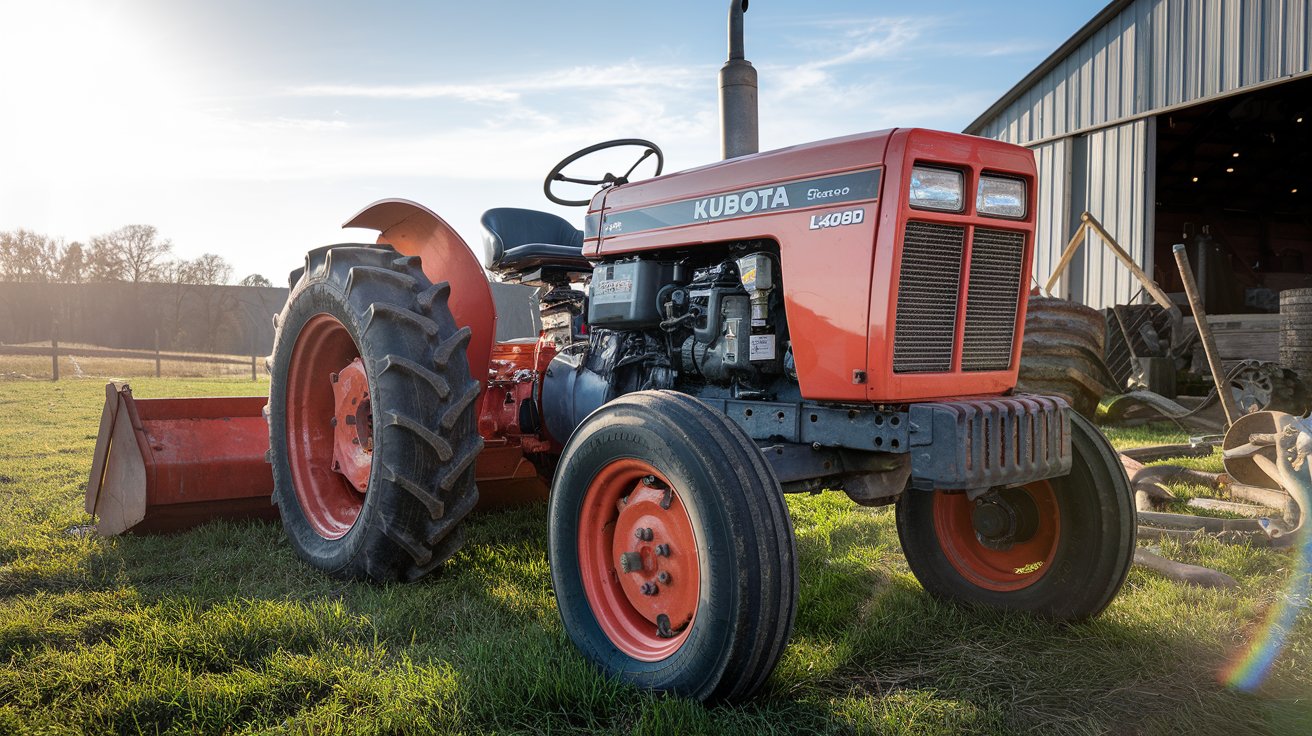This guide delves into common Kubota L4060 problems, including fuel system issues, starter solenoid failures, and hydraulic challenges. It provides actionable solutions for maintaining components like the engine oil filter, fuel pump, and tires, ensuring your tractor performs at its best. With tips on proactive maintenance, troubleshooting, and knowing when to seek professional help, this article equips Kubota L4060 owners with the knowledge to keep their machine running smoothly and efficiently.
“Struggling with Hydraulic Issues? Learn How to Keep Your Kubota’s Lift Capacity at Peak Performance!”
“What You Didn’t Know About Fuel System Maintenance Could Be Costing You More Than You Think.”
“Prevent Tire Wear and Improve Stability with These Easy Maintenance Tips!”
“Overheating Troubles? Discover Pro Tips to Keep Your Kubota L4060 Cool and Reliable!”
In this guide, we’ll address common Kubota L4060 problems, offer expert advice, and provide actionable solutions to get you back to work with minimal downtime.
Understanding Common Kubota L4060 Problems
The Kubota L4060 is designed for durability, but users may occasionally encounter challenges. Let’s dive into some common issues and how to address them effectively.
1. Fuel-Related Issues
Fuel system problems can disrupt your tractor’s performance. Here’s how to identify and resolve them:
- Clogged Fuel Filter: A clogged fuel filter can restrict fuel flow, causing power loss or engine stalling.
- Solution: Replace the fuel filter regularly. Check your owner’s manual for the recommended replacement interval.
- Faulty Fuel Pump: A failing fuel pump may lead to inadequate fuel delivery.
- Solution: Inspect the fuel pump for leaks or unusual noises. Replace it if necessary.
- Contaminated Fuel: Dirty or water-contaminated fuel can cause significant engine issues.
- Solution: Drain the fuel tank and refill it with clean, high-quality diesel. Use a fuel stabilizer to prevent future contamination.
2. Starter Solenoid and Starter Relay Problems
Starting issues are a common concern among Kubota L4060 owners. The starter solenoid and relay are key components in the ignition system.
- Symptoms: Clicking sounds when turning the key, or the engine not cranking.
- Solution: Check the starter solenoid and relay connections for corrosion or loose wires. Replace damaged parts if necessary.
3. Engine Oil Filter and Oil Change Maintenance
Regular oil changes and proper engine oil filter care are critical for engine longevity.
- Common Issues:
- Neglecting oil changes can lead to sludge buildup and reduced engine efficiency.
- A clogged engine oil filter can impede oil flow.
- Solutions:
- Perform oil changes as recommended in the manual. Ensure you use the correct oil grade for optimal performance.
- Replace the engine oil filter during each oil change to maintain clean oil circulation.
4. Tire and Rear Wheel Spacers
Tire-related issues and improper installation of rear wheel spacers can affect stability and traction.
- Tire Issues:
- Uneven tire wear or low pressure can compromise performance.
- Solution: Check tire pressure regularly and adjust according to specifications. Rotate tires to ensure even wear.
- Rear Wheel Spacers:
- Improperly installed spacers may cause wobbling or uneven weight distribution.
- Solution: Ensure spacers are installed correctly and tightened securely. Consult your manual or dealer for proper specifications.
5. Lift Capacity Challenges
The Kubota L4060 has a rated lift capacity, but overloading can strain the hydraulics.
- Symptoms: Difficulty lifting loads or sluggish hydraulic response.
- Solution: Avoid exceeding the lift capacity. Check hydraulic fluid levels and top up if needed. Inspect hoses for leaks or damage.
6. Drain Plug and Brush Guard Maintenance
Routine checks of the drain plug and brush guard can prevent bigger problems down the line.
- Drain Plug Issues:
- A loose or damaged drain plug can lead to oil leaks.
- Solution: Tighten the drain plug securely after oil changes. Replace it if threads are worn.
- Brush Guard Care:
- Damage to the brush guard can leave critical components exposed.
- Solution: Inspect the brush guard for dents or loose bolts. Repair or replace as needed to protect your tractor.
Proactive Maintenance Tips for Your Kubota L4060
Preventive maintenance is the key to avoiding costly repairs. Here are essential tips to keep your tractor in top shape:
Regular Inspections
- Check all components, including tires, hydraulics, and the engine, for wear and tear.
- Inspect electrical connections to ensure proper functioning of the starter solenoid and relay.
Fluid Checks and Changes
- Monitor levels of engine oil, hydraulic fluid, and coolant. Low or dirty fluids can cause severe damage.
- Replace fluids at regular intervals to maintain efficiency and prolong the lifespan of components.
Keep It Clean
- Remove debris from the brush guard and other exposed areas after each use.
- Clean the fuel tank and drain plug to prevent contamination.
Store Properly
- Park the tractor in a covered area to protect it from harsh weather.
- Use a tractor cover for added protection.
Troubleshooting Guide for Kubota L4060 Owners
Starting Problems
- Possible Causes: Faulty starter solenoid, dead battery, or corroded connections.
- Fix: Charge or replace the battery. Clean terminals and check the starter components.
Hydraulic System Issues
- Symptoms: Slow or unresponsive hydraulics.
- Fix: Check fluid levels and inspect for leaks. Replace worn-out hoses.
Overheating
- Causes: Clogged radiator, low coolant, or dirty engine components.
- Fix: Clean the radiator and refill coolant. Remove debris around the engine.
Poor Traction
- Causes: Incorrect tire pressure or worn treads.
- Fix: Adjust tire pressure and replace worn tires.
When to Seek Professional Help
While many issues can be resolved with regular maintenance, some require professional attention. Contact a certified Kubota technician if:
- The engine won’t start despite troubleshooting.
- Hydraulic issues persist after fluid replacement.
- Unusual noises or vibrations occur during operation.
Frequently Asked Questions (FAQs)
1. How often should I replace the fuel filter on my Kubota L4060?
It’s recommended to replace the fuel filter every 200 hours of operation or as specified in the owner’s manual.
2. What type of oil should I use for my Kubota L4060?
Use high-quality diesel engine oil with the grade recommended in your tractor’s manual, typically 15W-40.
3. How can I prevent hydraulic system issues?
Regularly check hydraulic fluid levels, inspect hoses for leaks, and replace the hydraulic filter as part of routine maintenance.
4. Why won’t my Kubota L4060 start?
Common reasons include a dead battery, faulty starter solenoid, or corroded connections. Inspect these components to identify the issue.
5. What is the lift capacity of the Kubota L4060?
The Kubota L4060’s lift capacity varies by model and attachments but is generally around 2,200 pounds. Check your manual for exact specifications.
6. How can I maintain my tractor’s tires?
Monitor tire pressure regularly, rotate the tires to ensure even wear, and replace them when the treads are worn out.
7. What should I do if the engine overheats?
Turn off the tractor, let it cool, and check the radiator for clogs or low coolant levels. Clean the radiator and refill coolant as needed.
8. How do I properly store my Kubota L4060?
Park in a covered area, use a tractor cover, and disconnect the battery if storing for an extended period.
9. How can I fix a loose drain plug?
Tighten the drain plug securely during oil changes. If the threads are worn, replace the plug to prevent leaks.
10. When should I replace the starter solenoid?
Replace the starter solenoid if you hear clicking sounds during ignition or if the engine fails to crank after checking other components.
Conclusion
Maintaining your Kubota L4060 is essential to its performance and longevity. By addressing common problems like fuel system issues, tire maintenance, and hydraulic challenges, you can minimize downtime and keep your tractor running efficiently. Remember, routine inspections and timely repairs are your best allies. Have tips or experiences to share? Drop them in the comments—we’d love to hear from you!

